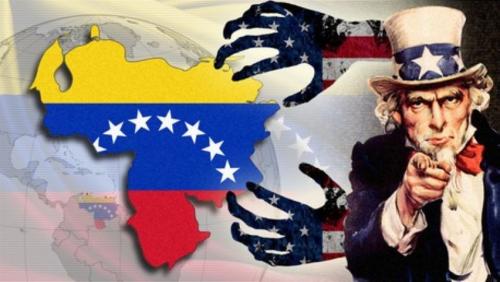The war declared by the US against Venezuela
The United States and their allies give no respite in their campaign to overthrow the present Venezuelan government headed by Nicolás Maduro.
- Análisis

The United States and their allies give no respite in their campaign to overthrow the present Venezuelan government headed by Nicolás Maduro. Two weeks ago, they attempted to put an end to the Bolivarian project with an assault on the life of President Maduro. Surprisingly the technology utilized did not succeed. At present, the mainstream media are saturating the region with news about the Venezuelans who are walking towards the borders of Peru and Ecuador. Whole groups are abandoned by their “coyotes” creating apparent humanitarian problems.
According to Aram Aharoniam “the analysis of the Big Data (that allows information to interpret itself and get ahead of our intentions) and the algorithms of the “black box,” are utilized to test truth and confidence.” The protests in Venezuela as well as the images of families, distributed through social media, walking along the highways of Colombia and Ecuador to reach Peru, appear to be fabricated. It is a tactic utilized by the mainstream media controlled by the news agencies of the US, since Guatemala (in 1954) including Chile (1973) and recently in Nicaragua (2018).
The destabilizing plan of Washington against Venezuela extends to the petroleum reserves. The plan of the US consists of three coordinated measures. The first seeks to prepare the terrain for creditors to attempt to seize Venezuelan assets in the US (Citco and others). Conoco-Phillips has just confiscated two billion dollars in assets of PDVSA in the Caribbean. The second maneuver would be to undermine the stability of the workers of the PDVSA oil company that extracts the ‘black gold” from the depths. The third would be that President Trump and his followers in Europe impose additional sanctions on the Bolivarian economy.
According to the US think tank World Politics Review (WPR), oil production in Venezuela has been diminishing since the death of Hugo Chávez, the leader of the Venezuelan revolution. At the present time, it produces 1.34 million barrels daily. The biggest buyer of Venezuelan crude is the United States with 33 per cent of the exports.
Washington can suspend the purchase of Venezuelan petroleum to create a currency crisis in the country of Bolívar. But as Lisa Viscidi and Nate Graham of WPR say, the measure could provoke a negative reaction among US consumers that would threaten the political aspirations of President Trump. The suspension of imports of Venezuelan crude to the US would create an imbalance between supply and demand in the US market. This situation would raise the price of gasoline at the pump stations and negatively impact the ordinary consumer. That is to say, it would create discontent among citizens who are now preparing to vote in the mid-term elections of the United States Congress in November of this year (barely two months away). The most negatively affected would be the present inhabitant of the White House.
The US has another card to play. They could interrupt the export of “products derived from petroleum and light petroleum, known as condensates. Venezuela imports these condensed products to mix with their extra heavy petroleum.” Viscidi insists that Venezuela would have to seek suppliers in other countries. She mentions China and Russia. Indeed, she foresees the fall of the Venezuelan government and the entrance of the International Monetary Fund (IMF) as a co-governor. Apparently everything is prepared for this.
Viscidi concludes that “if one of these three scenarios develops – the massive seizure of assets, an exodus of workers or more sanctions – the oil production and income of Venezuela will collapse. Only the Wall Street speculators could celebrate, as their own doing, the fall of the Venezuelan government”.
The US analysts today are worried that the sanctions of the Trump government may push Venezuela to deal with the big petroleum countries of Russia and China. According to these sources, the government could transfer 29 billion barrels of petroleum, almost 10 per cent of their proven reserves, valued by the government at 1.9 billion dollars, to the Central Bank to serve as guarantees for new loans from Russia and China.
The war declared by the US banks is placing its stakes on converting Venezuela into a “Failed State.” That is, a country without the capacity for self-governance, whose institutions would cease to function. The government of President Maduro is maneuvering in the opposite direction. It is stabilizing its economy, the victim of the US blockade, and has managed to neutralize the mobilizations of the opposition that created anxiety for the citizens and shortages of basic essential goods.
August 30 2018.
(Translated for ALAI by Jordan and Joan Remple Bishop)
- Marco A. Gandásegui, Jr., Professor of Sociology of the University of Panama and Researcher associated with the Centre of Latin American Studies Justo Arosemena (CELA).
Del mismo autor
- La pandemia no es el fin del capitalismo 23/04/2020
- Hay que masificar las pruebas contra un virus clasista 19/04/2020
- ¡Qué falta hacen los Comités de Salud de J. Renán Esquivel! 09/04/2020
- La desigualdad social y la desconfianza contribuyen a la epidemia 02/04/2020
- Hacen falta más ‘pruebas’ para ‘suprimir’ el coronavirus 26/03/2020
- La crisis del capitalismo y el coronavirus 19/03/2020
- Urge una movilización general para atacar el corona-virus 12/03/2020
- Se necesita liderazgo y transparencia para enfrentar el corona-virus 05/03/2020
- EEUU veta relaciones entre Panamá y China 27/02/2020
- Roberto Arosemena, sus ideas perduran y sus luchas continúan 20/02/2020
Clasificado en
Clasificado en:
Desestabilización
- Rosa Miriam Elizalde 15/11/2021
- Francisco Domínguez 11/08/2021
- Clara Sánchez 04/08/2021
- José Manuel Zelaya rosales 30/07/2021
- Francisco Domínguez 21/07/2021
